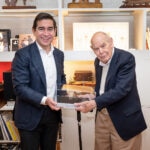Carlos Torres Vila, President of the BBVA Foundation, presents the Frontiers Award to Gerald Holton
Gerald Holton, who was unable to attend the awards ceremony in person, received the BBVA Foundation Frontiers of Knowledge Award in Humanities and Social Sciences from the President of the BBVA Foundation, Carlos Torres Vila, at his home in Cambridge (Massachusetts). "This award recognizes Holton's great contribution to the understanding of the cultural dimension of science," said Torres Vila.

In 2021, the Frontiers of Knowledge Award in Humanities bestowed by the BBVA Foundation went to Harvard University Professor of Physics and History Gerald Holton, “for his many seminal contributions to the history of science in the 19th and 20th centuries, in which he has shown a special sensitivity to cultural, philosophical, sociological and gender-differentiated contexts,” according to the jury's report at the time.
For health reasons, Professor Holton was not present at the awards ceremony held in Bilbao, and could only express his gratitude for the recognition through a video. For this reason, Carlos Torres Vila visited him at his home in Cambridge (Massachusetts) to personally present him with this award.
“This award recognizes Gerald Holton's outstanding contribution to the understanding of the cultural dimension of science,” said the BBVA Foundation President, who also emphasized the work carried out in recent decades by the Harvard University professor to “combat the phenomenon of pseudoscience proliferation.”
Holton is one of the main world leaders in the analysis of how science influences the shaping of society's culture and how each historical period intimately conditions scientific practice by influencing the creation of theories and models.
Furthermore, over the last 50 years, the American physicist and historian has advocated the need to bring scientific culture to the general public and has tirelessly defended the value of rationality and knowledge to combat the phenomena of glorification of irrationality that, throughout history, have contributed to the phenomenon of totalitarianism, exclusion and the persecution of minorities.
The jury of the Frontiers Awards also recognized his "innovative contributions to the teaching of science and his decisive role in the preservation of Albert Einstein's documentary legacy", as well as his studies on the fate of the children who had to leave Nazi Germany, a circumstance that he experienced first-hand, as he belongs to the 7% of Jewish children - of a total of 1.6 million - who survived the Holocaust.